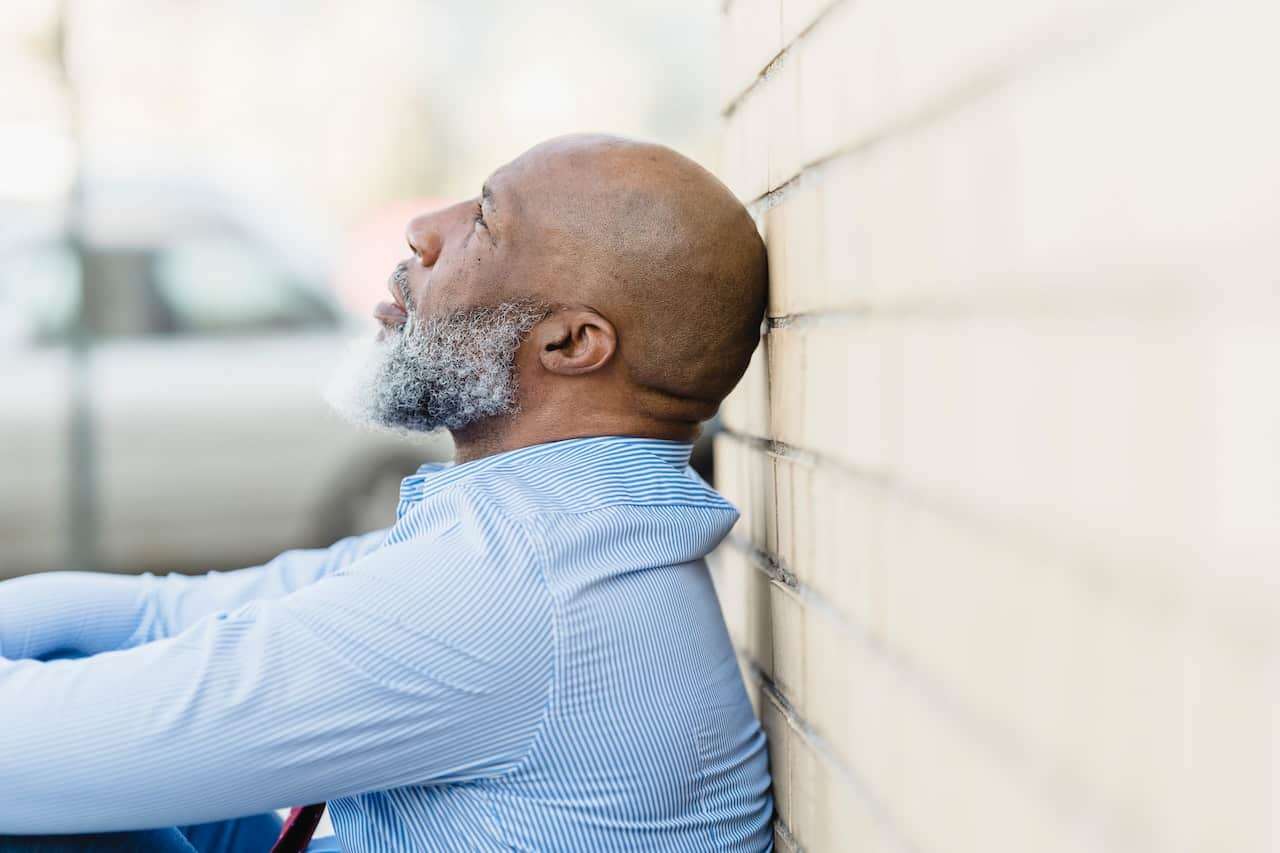Emotional damage is a common yet often overlooked aspect of our well-being. It can have huge effects on our lives, relationships, and overall happiness.
It can make us feel insecure, disconnected, and impact our mental health. Emotional damage can also strain our relationships and hinder our ability to trust and love.
However, the power to overcome it lies in first acknowledging it. Recognizing the signs of emotional damage is the first step toward healing and reclaiming our emotional well-being.
So, let’s talk about the signs that indicate that someone has been emotionally damaged and provide practical tips to begin the process of recovering from being emotionally damaged.
What Does It Mean To Be Emotionally Damaged
Emotional damage is the negative impact that experiences or events can have on our emotions and mental well-being. It’s like when something happens that hurts us deeply on the inside and leaves lasting effects.
It can make us feel really sad, anxious, or angry for a long time, even after the event has passed. This damage can affect many aspects of our lives, like how we see ourselves and how we relate to others.
For example, emotional damage can make us doubt ourselves, feel unworthy, or make it hard for us to trust others. It can also affect our relationships, causing conflicts or making it difficult to form close relationships with people.
Sometimes, emotional damage can even show up physically, like insomnia, nightmare, or muscle / joint pain.
Why Do People Get Emotionally Damaged?
You might think that you or someone you know is emotionally damaged. But have you ever wondered why this happens? How does someone end up feeling this way?
Well, here are some common reasons why someone may be emotionally damaged.
Traumatic Events
The emotional damage may be due to the experience or witness of traumatic events, such as physical or sexual abuse, natural disasters, accidents, violence, or the death of a loved one, and it can have a profound impact on a person’s emotional well-being.
Childhood Neglect or Abuse
Experiencing neglect, emotional abuse, or any other kind of abuse during childhood can significantly affect a person’s emotional development and overall mental health.
Unresolved issues from childhood, such as unresolved trauma, attachment problems, or dysfunctional family dynamics, can continue to mess with a person’s emotional well-being throughout their lives if not addressed.
Bullying
Persistent bullying, whether it occurs in childhood, adolescence, or adulthood, can cause significant emotional damage. It can lead to low self-esteem, anxiety, depression, and feelings of powerlessness.
Apart from the ones that happen during high school days, there are other forms of bullying that may even extend to adulthood.
Loss or Grief
The loss of a loved one, a significant relationship, a job, or any major life change can trigger profound grief and emotional distress and make people lose interest in activities and even in people close to them prior to the incident.
Toxic Relationships
Being in a toxic or abusive relationship, whether it is romantic, familial, or friendship, can also be another cause for emotional damage over time.
Manipulation, control, and constant negativity can erode a person’s self-worth and emotional well-being.
Loneliness or Social Isolation
When you feel lonely for too long or maybe you willingly or unwillingly isolate yourself socially, social isolation, your mental and emotional health can be heavily affected.
Humans are social beings, and a lack of meaningful connections and social support can lead to feelings of emptiness, sadness, and anger.
High Level Of Stress
Long-term exposure to high levels of stress, such as ongoing financial problems, work-related stress, or living in an unsafe environment, can lead to emotional exhaustion, anxiety, and depression.
Discrimination and Prejudice
Experiencing discrimination based on factors such as race, ethnicity, gender, sexual orientation, or religion can also cause significant emotional distress and damage to an individual’s self-esteem.
Illness or Disability
Living with a chronic illness or disability can bring about emotional damage because it becomes difficult to perform daily activities, limits your mobility, and causes constant discomfort which can lead to grief, frustration, and feelings of isolation.
Personal Failure or Rejection
When we put our heart and soul into something, the fear of failing or being rejected can be overwhelming. And when it actually happens, it can make us doubt ourselves.
We start questioning our abilities, talents, and even our worth. It’s like a constant nagging voice that tells us we’re just not good enough.
The emotional damage caused by failure or rejection can bring on a whole rollercoaster of emotions. Sadness, anger, and even depression.
Emotional Neglect
When the important people in our lives don’t pay attention to our feelings or needs, then we’re not far from being emotionally damaged
Lack of emotional support, affection, and nurturing or growing up in an environment where emotional needs are consistently ignored or invalidated can lead to being damaged emotionally.
Being emotionally damaged due to emotional neglect will show up as having trouble showing emotions, dropping self-esteem, problems with forming or maintaining relationships, and a lot more.
Self-Criticism or Perfectionism
When you’re used to setting high standards for yourself and you’re constantly engaging in self-criticism or perfectionism, emotional damage might be the result or it might be a sign that you’re emotionally damaged.
Perfectionism will always make you feel there are more perfect ways to do things and that you’re not good or have not done enough, and that will only impair your ability to celebrate your wins or enjoy life’s accomplishments.
10 Signs You’re Emotionally Damaged
Recognizing the signs of emotional damage is the first step toward healing. It means you’re becoming aware of how it’s affecting you and acknowledging that it’s not in any way your fault.
With that out of the way, here are 10 common signs to look out for in an emotionally damaged person or how to tell you’re emotionally damaged yourself.
Difficulty Forming And Maintaining Healthy Relationships
If you’re emotionally damaged, you might find it challenging to trust others, fear getting close to someone intimately, or struggle to establish and maintain deep relationships.
It’s common to feel anxious when meeting new people, unsure of how they might treat you. You might even notice a pattern in your relationships, where you either keep people at arm’s length or avoid them altogether.
Low Self-Worth
When you feel like you’re just not good enough or start doubting yourself or your ability then your emotions have been knocked around. And that inner voice can be downright mean, always putting you down when you’re all up to start something meaningful.
Then your self-worth is down to earth and it’s like you’re on a never-ending quest for validation, seeking approval from everyone around you.
And to top it off, you can’t help but compare yourself to others, playing that comparison game that nobody ever wins.
Fear Of Intimacy
You discover that your ability to trust and open up has been messed with. You have this deep fear of being hurt or rejected, making it so difficult to let anyone in or form meaningful connections.
You might find yourself building walls around your heart, all in an effort to protect yourself from getting hurt again. These walls can prevent you from experiencing genuine intimacy and can leave you feeling disconnected from others.
And sometimes, without even realizing it, you catch yourself comparing your new love interest to the person who caused you pain in the past.
Emotional Instability
When you’ve been emotionally hurt, it can leave a mark on you. It’s like your emotional sensitivity gets turned up a notch, making your mood swings a bit more unpredictable.
Suddenly, you find yourself facing everyday situations and feeling like your emotional reactions are way bigger than they should be.
It’s as if anger decides to show up even for the tiniest reasons, catching you off guard and making it tricky to keep your emotions in check.
Persistent Feelings Of Guilt, Shame, Or Anger
When you’re damaged emotionally, you may find yourself carrying around unresolved emotions that just won’t go away.
It’s like a lingering feeling of guilt, shame, or even uncontrolled anger that keeps affecting your well-being.
Sometimes, you may end up blaming yourself for things that happened in the past, constantly carrying that unnecessary weight on your shoulders.
And there are moments when you struggle with feelings of anger and resentment towards others.
10 Ways To Fix Being Emotionally Damaged
To heal from emotional damage, then you need to be proactive and take the crucial steps toward healing and self-restoration. Here are essential steps to start with.
Acknowledge And Accept
If you’re emotionally damaged, the first fix is to accept that you are, but it’s not all doom and gloom! Healing is possible, and it starts with embracing self-compassion and understanding that it’s a journey that takes time and effort.
Also, recognize that you’re not alone in this and that others have been through similar struggles so let yourself acknowledge the pain and validate your experiences.
Stop Abusing Substances
As someone who is emotionally down, it’s tempting to turn to substances like alcohol or drugs for a quick escape which seems to offer momentary relief from your pain, making everything feel numb and calm.
Just like a fake sense of peace. But here’s the thing: it’s not real. While substances might help us forget for a little while, they don’t actually fix the root of our emotional struggles.
Substance use and abuse is just like putting a band-aid on a deep wound; sure, it might cover it up for a bit, but it won’t heal it. In fact, it can make the wound even bigger. So by all means, avoid drugs and alcohol
See A Therapist
Reach out and talk to someone, consider consulting with a qualified therapist who specializes in trauma and emotional healing. They can really be of help in developing healthy coping strategies.
If one-on-one therapy feels overwhelming, you might find comfort in group therapy or support groups. You may also consider alternative approaches like art therapy or mindfulness practice.
Painting, writing, or playing an instrument can help you express and process your emotions in a unique way.
Mindfulness practices, on the other hand, can bring you back to the present moment and make you feel a sense of calmness.
Give Room For Support System
These days, there are online forums for almost anything including the ones for overcoming emotional struggles.
When you’re with like-minded people who understand what you’re going through, you’ll heal faster because you’re no longer alone in your struggles.
Just knowing that others have faced similar challenges can bring a tremendous sense of relief and comfort.
Sharing your experiences and getting to listen to the experiences of others can help alleviate feelings of isolation and offer a sense of connection and belonging
Focus On Your Ability
To get yourself out of the emotional ditch, you need to cultivate a healthier mindset by focusing on your abilities, strengths, and accomplishments, acknowledging your personal growth, and celebrating your achievement, while also engaging in activities that bring you joy and happiness.
Reflect on past accomplishments and remind yourself of the challenges you have overcome. Embrace your positive traits and recognize your resilience and the progress you have made, no matter how small.
Also, celebrate your successes, both big and small, and give yourself credit for the hard work you put into achieving them. Discover what brings you joy and fulfillment, and make time for those activities.
It may be it’s pursuing a hobby, spending time with loved ones, exploring nature, or engaging in some sort of self-care routine.
No More Negative Thought Patterns And Beliefs
Emotional damage will always in one way or the other mess with your thinking often leading to negative thought patterns and self-limiting beliefs.
But a good way to tackle these unhelpful thoughts is by actively replacing them with positive and empowering ones. It might sound simple, but it can make a big difference.
You can start by practicing affirmations and positive self-talk. Affirmations are like little reminders or positive statements that you repeat to yourself.
They help shift your mindset and bring in more, self-acceptance, and self-love.
Be Socially Intentional
Being socially intentional is as simple as actively seeking out and nurturing healthy relationships. and it can greatly impact your healing process.
No matter how society makes us think we’re independent, we all as humans need other humans to survive, and that little helps will always come from people, not flowers.
Practice Being More Self-Aware
Be more present in the moment, and don’t let your past get in the way of the better life that your present has to offer. We’ve all done things we’re not proud of, so forget the past that haunts you;
It may not be as easy, but it’s achievable if you actively check your thoughts every now and again. Allow the past to remain where it belongs – in the past.
No Blame Games
Yes, other people were responsible for your trauma, the bullying, and all the other reasons that led to your emotional damage, but where will the finger-pointing get you? Absolutely nowhere, so stop blaming them and start healing instead.
Even if you choose to keep blaming them, they are somewhere out there living their lives unaware of the harm they have done. So why not just..
Forgive And Let Go
Forgiveness is a powerful tool for emotional healing. Work towards forgiving yourself and others, letting go of resentment, and freeing yourself from the weight of the past.
Forgiveness does not mean you gave in or condone the actions or behaviors that caused you harm, but rather releasing the emotional burden and reclaiming your own peace by leaving the past in the past.
Read More
How to stop trying to fix things you didn’t break
How to get something off your mind permanently
Depressed or just dramatic? Here’s the difference



